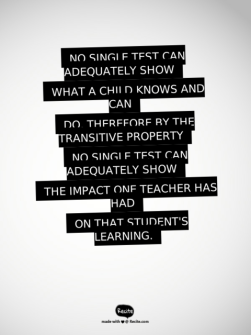
As each child is different and has different needs, so too are the teachers who educate them. And since no single test (especially one that is not created by the teacher and/or school department) can adequately assess what one student knows and can do at any given time, it is an invalid way of measuring teacher effectiveness.
In the world of accountability we live in, I can appreciate the need to hold all of the stakeholders accountable for the successes and/or failures of our students, teachers and schools, but summative testing at the end of the year is not the way to do it.
Educating children is a subtle art that requires multiple moving parts and many different people on many different occasions. Using one test as a marker of growth for either the child or the teacher is oversimplifying something that is really difficult to quantify to begin with.
Learning is nuanced and requires a good deal of markers to truly understand its depth and breadth. So when we are asked to score a single student test that will ultimately factor into a colleague’s growth measurement, it is more than a little uncomfortable.
So much doesn’t show up on a page, both good or challenging. People have bad days (students and adults) and no one learning assessment should be the determining factor in growth over a period time.
As we continue to look deeply into evaulation systems of learners, we must consider the variety of ways that kids can learn and show what they know and then provide them many opportunities to show it. Let the learning live and thrive and then invite them into the process of assessment and evaluation.
In this same way, teachers must be involved in their own evaluation process as well. Much of our growth is often invisible unless we are asked to highlight what we have seen.
What if:
- Teachers set personal goals at the beginning of the school year and pre-determined success criteria with their supervisers.
- Using whichever standards the school district or system uses, teachers chose a focus area for the year and decided a final project or portolio that would address the specific goals set and agreed upon with the teacher and administrator.
- Over the course of the year, teachers were observed for specific areas selected and discussed in pre-observations and then only assessed in those particular areas at that time.
- Actionable feedback was provided by the administrator, to help teachers grow, NOT act as a gotcha, but rather meant to nurture teacher practice so that all students could benefit.
- Teachers were expected to reflect regularly either in a notebook or on a blog and share those reflections regularly. This would serve as documentation on learning throughout the process.
- Teachers collected evidence of learning as it was happening in a variety of forms, particularly when they took risks in their lessons. Whether taking pictures or videos, or student work samples, teachers could show evidence of student learning throughout the year.
- While students were developing their own learning portfolios, teachers created one of their own to serve as a collection of evidence and/or reflection of learning to show process both for their own evaluation and as a model for student learning.
- Teachers wrote a formal reflection at the end of the year that served as a self-assessment and evaluation of their work based on the success criteria decided upon at the beginning of the year.
- Teachers weren’t asked to waste valuable learning time giving standardized tests that barely address the uncommon needs of each of his/her unique learners.
- All learners were given “re-do” opportunities so that success criteria can be demonstrated in the amount of time necessary for each individual person.
There are many shades of gray when it comes to learning and if we think of it on a mastery scale inside of an environment that nurtures rather than seeks to catch us at our worst, the likelihood of both educator and student growth would be more achievable and more noticeable.
How would you like to be evaluated? Please share